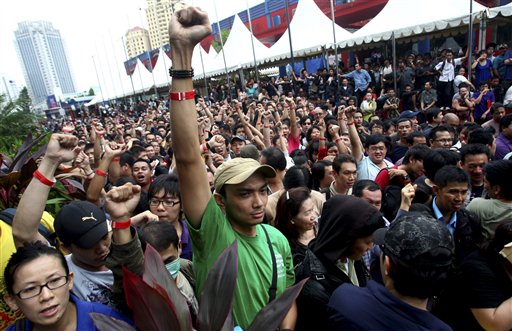 In the early, exciting days of digital economy development, every year counts!
In the early, exciting days of digital economy development, every year counts!
Here’s a review of the news that made a splash in Indonesia’s tech sector in the time it took the world to make its way around the sun once.
Netflix enters Indonesia, gets everything wrong
The US on-demand video platform Netflix chose the wee days of 2016 to conquer the world. It made its service available in 130 new countries all at once.
In Indonesia, things didn’t go as smoothly as expected. The country’s largest internet provider, state-owned telco Telkom, decided to block the service. It had its own plans in the on-demand video realm.
An unapologetic CEO Reed Hastings on stage at a conference in Bali further soured the relationship with Indonesia’s largest telco](https://www.techinasia.com/etflix-reed-hastings-gets-slammed-by-telkom).

CEO Reed Hastings onstage at CES 2016. Photo credit: Netflix.
The incident serves as a reminder: international tech giants – especially those who deliver large quantities of data across local networks – must play nice with the telcos.
Fintech association forms, ushering in a new era
Plans for the formation of an Indonesian fintech association already began to coalesce last year, but it became official early this year. The inauguration of an industry association doesn’t exactly make for hot news. But in this case, it ushered in a new era.
Regulators, banks, and fintech startups are working together more closely. A big fintech festival took place a few months later. If the past belonged to ecommerce, the coming years will likely see big developments in Indonesia’s fintech sector.
Ride-hailing vs. taxi industry: the battle is decided
It’s hard to believe that just a few months ago, the dispute between the taxi industry and ride-hailing apps like Uber and Grab was at its tumultuous peak.

In March, street protests in Jakarta turned violent. Screenshot via @arieparikesit.
In March, taxi drivers flooded the streets protesting the new tech firms who were disrupting the transportation business.
But it wasn’t long before taxi companies realized they couldn’t win the battle against technology. In May, major taxi company Blue Bird announced it would work together with homegrown ride-hailing startup Go-Jek. Fast forward another few months: Express, a rival taxi company, set up a partnership with Uber.
All eyes on Lazada Indonesia after Alibaba deal
Ka-boom! The news in April of Alibaba’s massive bet on Southeast Asia through its acquisition of Lazada shook up Indonesia’s ecommerce sector. After all, Lazada’s biggest operations are here.
All eyes are now on the new country CEO duo Florian Holm and Duri Granziol who are in charge of leading Lazada Indonesia under its new big boss, Jack Ma. As suggested by Florian, a form of Alipay as a digital payments channel on Lazada could be on the horizon.
Indonesian media firm takes over BlackBerry Messenger development
Indonesia has always been kind to Canadian phone maker BlackBerry. The phones were still widely used in the archipelago long after they went out of fashion elsewhere.
Even after cheap, feature-rich Android-based smartphones eventually replaced them, BlackBerry Messenger (BBM), which had become a standalone chat app, remained popular.
In an attempt to breathe new life into the brand, BlackBerry granted Indonesian media conglomerate Emtek the right to take over BBM development. Emtek has big plans for the chat app and developed a slew of localized features for its base of 60 million users in the country.

Thousands of Indonesians queue during the BlackBerry Bold 9790 launch in 2011. Photo credit: Otago Daily Times.Credit: Otago Daily Times.
Government throws its weight behind 1,000 Startups
This year saw the launch of a massive, government-endorsed startup development program.
The initiative – dubbed the ‘1,000 startups movement’ – plans to nurture the growth of 1,000 new startups until the year 2020. Collectively, these new startups are supposed to reach a valuation of US$10 billion.
This ambitious goal is now often cited by government officials, along with the prediction that Indonesia’s ecommerce transaction volume will reach US$130 billion in 2020.
Go-Jek’s blockbuster funding round makes it Indonesia’s first official unicorn
Once again, ride-hailing app Go-Jek was the local startup hero of the year. It stunned everyone with the US$550 million funding round announced in August which gave it unicorn status – the first Indonesian startup with an official valuation above US$1 billion.
Later that fall, Go-Jek quietly acquired a payments startup and is getting into digital payments.

Go-Jek CEO Nadiem Makarim on stage at Tech in Asia Jakarta 2016.
YesBoss resurrects, charges ahead with natural language processing for Indonesian
In October, virtual concierge startup YesBoss shut down its assistant service and let go of part of its staff. Many similar startups in the region suffered the same fate.
YesBoss’ core team stayed on and launched a new product called Kata. It’s a platform that helps other apps build customized Indonesian-speaking chatbots. At this point, Kata probably has the best grasp on how to make an AI converse in Indonesian. In the future, machines will be increasingly expected to understand spoken and written language, which makes Kata a valuable resource.
Google’s on-again, off-again tax deal
As the year drew to a close, Indonesia’s ongoing tax dispute with Google began heating up.
It looked like the Indonesian tax authority and the US tech goliath might settle for less than a hundred million dollars. But then the tune changed. Indonesia is not letting Google off the hook and is no longer interested in a settlement. It expects Google to pay around US$370 million with additional penalties on top.
Google has until the end of January to hand over the documents Indonesia’s tax authority requested. Other foreign internet giants like Facebook, which has a massive user base in Indonesia and clocks advertising revenues in the country, better watch this closely. The taxman might knock on their door next.
Apple gets approval to sell iPhone 7
In 2015, with much fanfare, Indonesia introduced a new law which will it more difficult to import 4G smartphones come 2017. At least part of the manufacturing, packaging, or even the software on the phone has to be made locally.
Big firms like Samsung made the necessary investments before the deadline and brought more manufacturing into the country. It was always a mystery how Apple planned to achieve compliance with the rule, as it doesn’t have any local factories.
Just before the rule takes effect, Apple got approval to sell its iPhone 7 in Indonesia, thanks to its promise to invest US$44 million in R&D.
This post Indonesia’s biggest tech stories of 2016 appeared first on Tech in Asia.
from Tech in Asia https://www.techinasia.com/indonesia-biggest-tech-stories-2016
via IFTTT

No comments:
Post a Comment